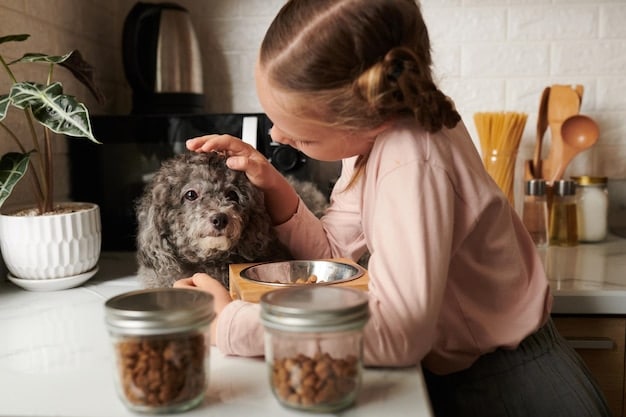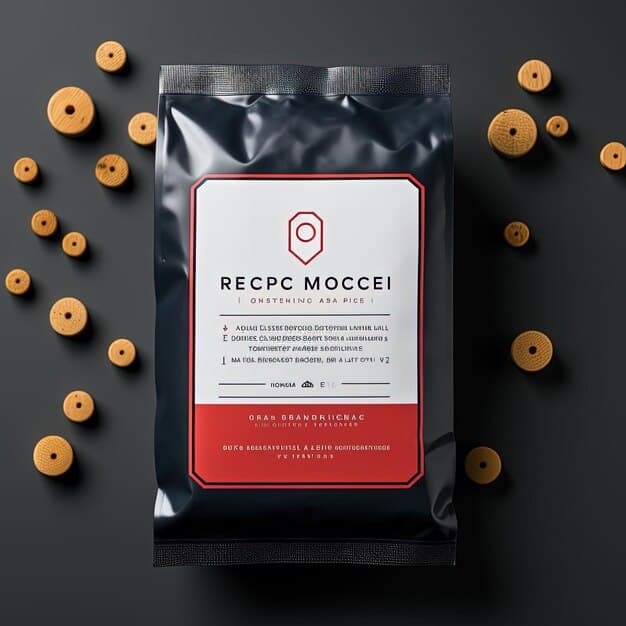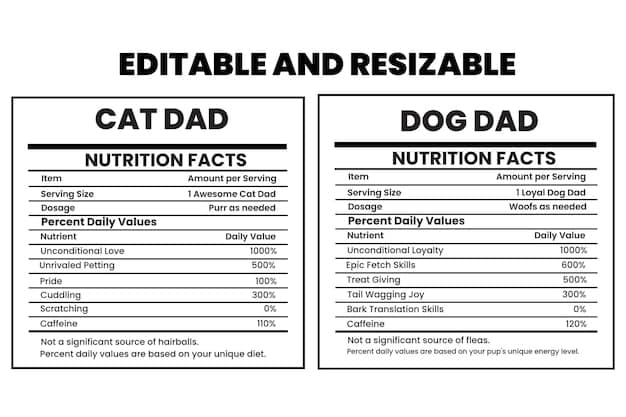Urgent Recall Notice: Pet Food Alert – Check the List Now!

Urgent Recall Notice: Is Your Pet’s Food on the List? Latest Updates and What to Do This article provides the latest updates on pet food recalls, offering essential information to help pet owners identify affected products and take immediate action to ensure their pet’s safety.
Have you heard about the latest urgent recall notice: is your pet’s food on the list? Latest updates and what to do are crucial steps to ensure your furry friend’s health and safety. Pet food recalls are more common than many pet owners realize, and staying informed is the best way to protect your beloved companion from potentially harmful products.
Understanding Pet Food Recalls
Pet food recalls are issued when a product is found to be potentially harmful to animals. These recalls can be initiated by the pet food manufacturer or by regulatory bodies such as the Food and Drug Administration (FDA) in the United States. Understanding the reasons behind these recalls and the process involved is essential for every pet owner.
Common Causes of Pet Food Recalls
Several factors can lead to pet food recalls. Contamination with bacteria, such as Salmonella or Listeria, is a frequent cause. Another common issue is the presence of toxins, like aflatoxin, which is produced by mold and can be found in grains. Mislabeling, where the ingredient list does not accurately reflect what’s in the food, and nutrient imbalances, where the food lacks essential vitamins or minerals, are also significant contributors.
The Recall Process: How It Works
When a potential issue is identified, the pet food manufacturer typically conducts an internal investigation. If the problem is confirmed, they will notify the FDA and initiate a voluntary recall. The FDA also conducts its own testing and can issue a mandatory recall if necessary. The recall notice includes details about the affected product, including the brand, product name, lot numbers, and expiration dates. It also provides instructions for consumers on what to do with the recalled product.

Staying informed about these processes can help you take swift action if your pet’s food is affected. Regularly checking for recall notices and understanding the reasons behind them will contribute to your pet’s well-being.
In summary, pet food recalls are a serious matter, but understanding their causes and the recall process can empower you to protect your pet effectively.
Latest Pet Food Recall Updates
Staying up-to-date with the latest pet food recall updates is crucial for every pet owner. Recalls can happen unexpectedly, and being informed allows you to take immediate action if your pet’s food is affected. Here are the latest updates and how to stay informed.
Recent Recalls: Brands and Products Affected
Recent recalls have involved various brands and products, often due to contamination or mislabeling. For instance, certain batches of dry dog food have been recalled due to Salmonella contamination, while some canned cat food products were recalled because of insufficient levels of essential vitamins. It’s essential to check the specific lot numbers and expiration dates to see if your pet’s food is affected.
Where to Find Reliable Recall Information
- FDA Website: The FDA’s website is a primary source for recall information. They provide detailed notices, including product names, lot numbers, and reasons for the recall.
- Pet Food Manufacturer Websites: Many pet food manufacturers post recall information on their websites. Checking the brand’s website can provide specific details and instructions.
- Veterinary Organizations: Organizations like the American Veterinary Medical Association (AVMA) often share recall information with their members and the public.
- Pet News Websites: Reputable pet news websites and blogs also compile and report recall information, making it easier to stay updated.
Staying informed can save your pet from potential health issues. Make it a habit to check these resources regularly.
In conclusion, staying informed about the latest pet food recalls involves monitoring reliable sources and understanding the specific details of each recall. This proactive approach ensures you can take swift action to protect your pet’s health.
Identifying Recalled Pet Food
Knowing how to identify recalled pet food is critical to ensuring your pet’s safety. Recall notices often include specific details that can help you determine if your pet’s food is affected. Understanding these details and knowing where to find them can save you time and prevent potential harm.

Key Information to Look For on Pet Food Labels
When a recall is announced, there are several key pieces of information you should look for on your pet food labels. The brand name and product name are the most obvious, but also pay close attention to the lot number and expiration date. The lot number is usually a series of letters and numbers printed on the packaging, and it helps identify the specific batch of food that is being recalled. The expiration date indicates how long the food is safe to consume.
Understanding Lot Numbers and Expiration Dates
Lot numbers and expiration dates are crucial for identifying recalled products. The recall notice will specify the exact lot numbers and expiration dates of the affected food. Compare these details with the information on your pet food packaging. If they match, your pet’s food is part of the recall.
Always double-check the lot number and expiration date, as these are the most precise ways to identify recalled products.
In summary, identifying recalled pet food involves carefully examining the product label for the brand name, product name, lot number, and expiration date. Understanding these details and comparing them with the recall notice can help you quickly determine if your pet’s food is affected.
What to Do If You Have Recalled Pet Food
Discovering that you have recalled pet food can be alarming, but knowing the proper steps to take can help you protect your pet and handle the situation effectively. Here’s what you should do if you find out that your pet’s food has been recalled.
Immediate Steps to Take
First, immediately stop feeding your pet the recalled food. This is the most crucial step to prevent any potential harm. Next, isolate the recalled food to prevent accidental consumption by other pets or animals. Wash your hands thoroughly after handling the food or its packaging to avoid spreading any contaminants.
Disposing of or Returning the Recalled Food
- Disposal: If the recall notice advises disposal, seal the food in a plastic bag and throw it away in a secure trash receptacle. Be sure to clean and sanitize any surfaces that the food may have touched, including pet bowls and storage containers.
- Return: Some recall notices may instruct you to return the food to the place of purchase for a refund or exchange. Check the specific instructions provided by the manufacturer or the FDA.
- Contact the Manufacturer: Reach out to the pet food manufacturer for guidance. They may offer specific instructions or compensation for the recalled product.
Taking these steps will help ensure your pet’s safety and resolve the issue efficiently.
In conclusion, if you have recalled pet food, the immediate steps include stopping feeding the food to your pet, isolating the product, and either disposing of it properly or returning it to the store. Following these instructions can help you protect your pet and handle the recall effectively.
Recognizing Symptoms of Food Poisoning in Pets
Recognizing the symptoms of food poisoning in pets is crucial for early detection and prompt veterinary care. If your pet has consumed recalled food or you suspect food poisoning, knowing the signs can help you take swift action to protect their health.
Common Symptoms to Watch For
Common symptoms of food poisoning in pets include vomiting, diarrhea, loss of appetite, lethargy, and dehydration. In severe cases, pets may experience muscle tremors, seizures, or collapse. If you notice any of these symptoms, it’s important to seek veterinary care immediately.
When to Seek Veterinary Care
If your pet exhibits any of the symptoms of food poisoning, it’s essential to contact your veterinarian as soon as possible. Early diagnosis and treatment can significantly improve the outcome. Be prepared to provide your veterinarian with details about the food your pet has been eating, including the brand, product name, lot number, and expiration date. This information can help your veterinarian determine the potential cause of the symptoms and provide appropriate treatment.
Prompt veterinary care can make a significant difference in your pet’s recovery.
In summary, recognizing the symptoms of food poisoning in pets, such as vomiting, diarrhea, and lethargy, is crucial for early detection and prompt veterinary care. If you suspect your pet has food poisoning, contact your veterinarian immediately to ensure they receive the necessary treatment.
Preventing Future Issues
Preventing future issues related to pet food requires proactive measures to ensure the safety and quality of your pet’s diet. By selecting the right food and storing it properly, you can minimize the risk of recalls and food poisoning.
Choosing Safe and Reputable Pet Food Brands
When selecting pet food, opt for brands with a strong reputation for quality and safety. Look for brands that conduct rigorous testing and quality control measures. Research the brand’s history and check for any past recalls or safety concerns. Choose foods that meet the nutritional standards set by the Association of American Feed Control Officials (AAFCO).
Proper Storage and Handling of Pet Food
- Storage: Store pet food in a cool, dry place to prevent spoilage and contamination. Use airtight containers to keep out moisture and pests.
- Handling: Wash your hands thoroughly before and after handling pet food. Clean pet bowls regularly to prevent bacterial growth.
- Expiration Dates: Always check the expiration date before feeding your pet. Discard any food that has expired.
Taking these precautions can help safeguard your pet’s health and well-being.
In conclusion, preventing future issues with pet food involves choosing reputable brands, storing food properly, and practicing good hygiene. By taking these proactive steps, you can reduce the risk of recalls and food poisoning, ensuring your pet enjoys a healthy and safe diet.
| Key Point | Brief Description |
|---|---|
| 🚨 Recall Notice | Stay updated on the latest pet food recalls. |
| 🧐 Check Labels | Verify brand, product, lot number, and expiration date. |
| 🚫 Stop Feeding | Immediately stop feeding recalled food to your pet. |
| 🩺 Vet Visit | Seek vet care for symptoms like vomiting or lethargy. |
Frequently Asked Questions (FAQ)
▼
Check the FDA website and the pet food manufacturer’s website for recall notices. Compare the brand, product name, lot number, and expiration date on your pet food label with the information in the recall notice to see if they match.
▼
Common symptoms include vomiting, diarrhea, loss of appetite, lethargy, and dehydration. In severe cases, pets may experience muscle tremors, seizures, or collapse. Contact your vet if you observe these symptoms.
▼
Stop feeding it to your pet immediately. Dispose of the food by sealing it in a plastic bag and throwing it away, or return it to the place of purchase for a refund or exchange, depending on the recall instructions.
▼
Choose reputable brands with good safety records, store pet food in a cool, dry place in airtight containers, wash your hands before and after handling pet food, and always check expiration dates before feeding your pet.
▼
The FDA website, pet food manufacturer’s websites, veterinary organizations like the AVMA, and reputable pet news websites are reliable sources for the latest pet food recall information.
Conclusion
Staying informed about pet food recalls and taking proactive steps can help protect your beloved pets from potential harm. By regularly checking for recall notices, understanding the symptoms of food poisoning, and choosing reputable brands, you can ensure your pet enjoys a healthy and safe diet.





